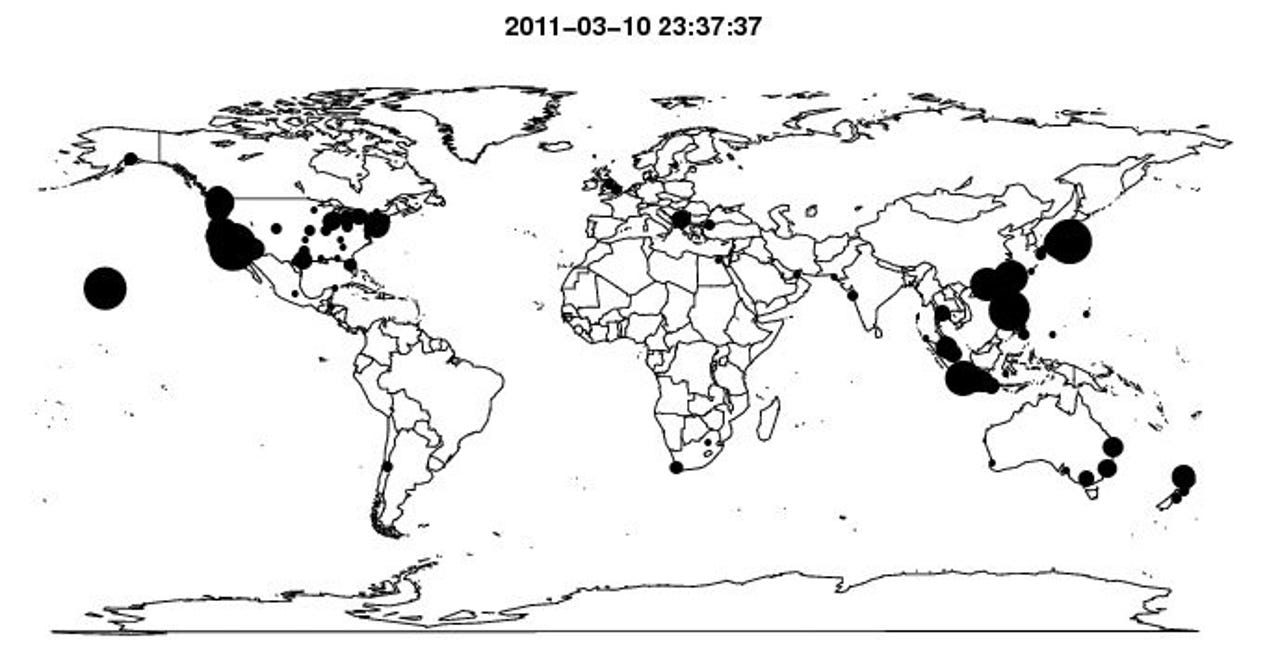Japan tsunami: How the news spread on Facebook
The news quickly spread to some parts of Asia, North America, and Europe. Facebook penetration in South America and Africa is noticeably lower.


1 of 10 Emil Protalinski/ZDNET
The news quickly spread to some parts of Asia, North America, and Europe. Facebook penetration in South America and Africa is noticeably lower. Although the actual map used is quite old and thus inaccurate (the Soviet Union was disbanded two decades ago), the data overlaid on top is quite interesting.
See Emil Protalinski's report, How news of Japan's earthquake, tsunami spread on Facebook
2 of 10 Emil Protalinski/ZDNET
More users in Asia start to post on Facebook about the event.
3 of 10 Emil Protalinski/ZDNET
More users in Europe start to post on Facebook about the event.
4 of 10 Emil Protalinski/ZDNET
The few users in South America and Africa start to become more active.
5 of 10 Emil Protalinski/ZDNET
The number of status updates significantly increases on the East coast in North America.
6 of 10 Emil Protalinski/ZDNET
The number of status updates significantly increases in South America.
7 of 10 Emil Protalinski/ZDNET
North America starts talking even more about Japan.
8 of 10 Emil Protalinski/ZDNET
The number of status updates significantly increases on the West coast in North America.
9 of 10 Emil Protalinski/ZDNET
Minor changes in status updates.
10 of 10 Emil Protalinski/ZDNET
Europe sees a huge increase. That's all we have! You can thank the Facebook Data Team for these graphs.
See Emil Protalinski's report, How news of Japan's earthquake, tsunami spread on Facebook
Related Galleries
Holiday wallpaper for your phone: Christmas, Hanukkah, New Year's, and winter scenes
![Holiday lights in Central Park background]()
Related Galleries
Holiday wallpaper for your phone: Christmas, Hanukkah, New Year's, and winter scenes
21 Photos
Winter backgrounds for your next virtual meeting
![Wooden lodge in pine forest with heavy snow reflection on Lake O'hara at Yoho national park]()
Related Galleries
Winter backgrounds for your next virtual meeting
21 Photos
Holiday backgrounds for Zoom: Christmas cheer, New Year's Eve, Hanukkah and winter scenes
![3D Rendering Christmas interior]()
Related Galleries
Holiday backgrounds for Zoom: Christmas cheer, New Year's Eve, Hanukkah and winter scenes
21 Photos
Hyundai Ioniq 5 and Kia EV6: Electric vehicle extravaganza
![img-8825]()
Related Galleries
Hyundai Ioniq 5 and Kia EV6: Electric vehicle extravaganza
26 Photos
A weekend with Google's Chrome OS Flex
![img-9792-2]()
Related Galleries
A weekend with Google's Chrome OS Flex
22 Photos
Cybersecurity flaws, customer experiences, smartphone losses, and more: ZDNet's research roundup
![shutterstock-1024665187.jpg]()
Related Galleries
Cybersecurity flaws, customer experiences, smartphone losses, and more: ZDNet's research roundup
8 Photos
Inside a fake $20 '16TB external M.2 SSD'
![Full of promises!]()